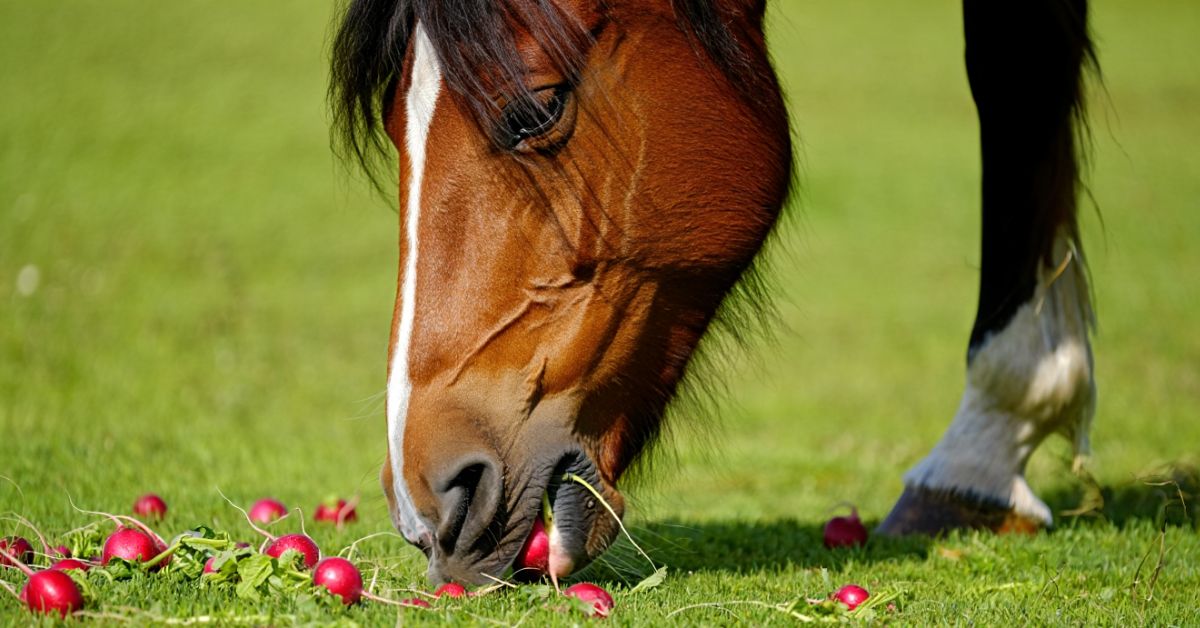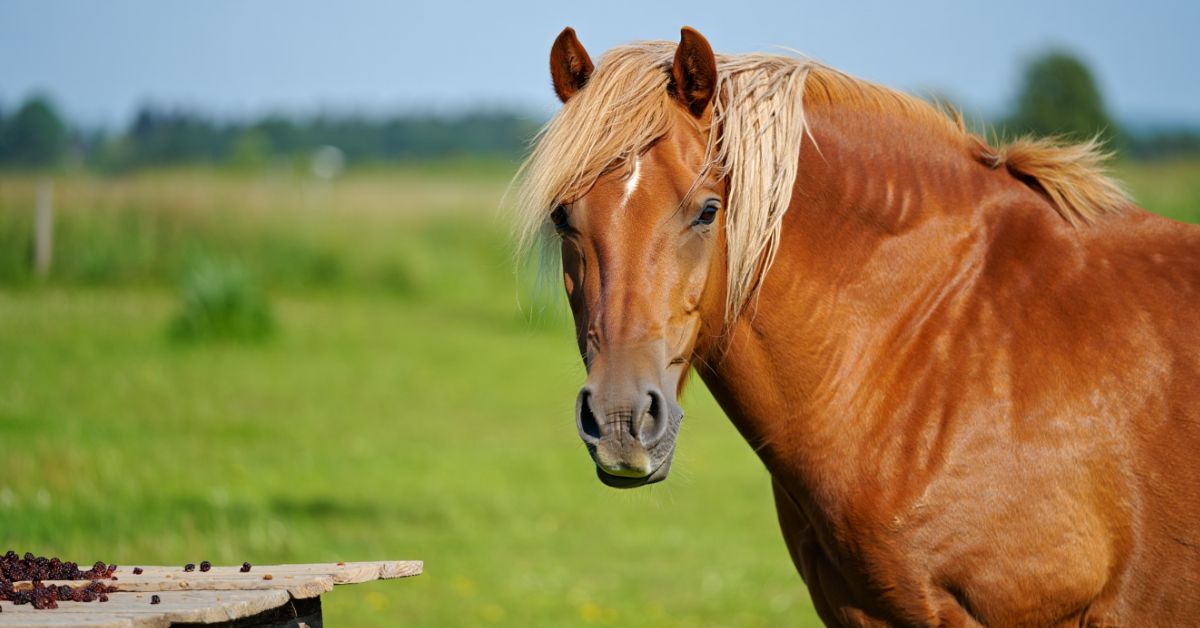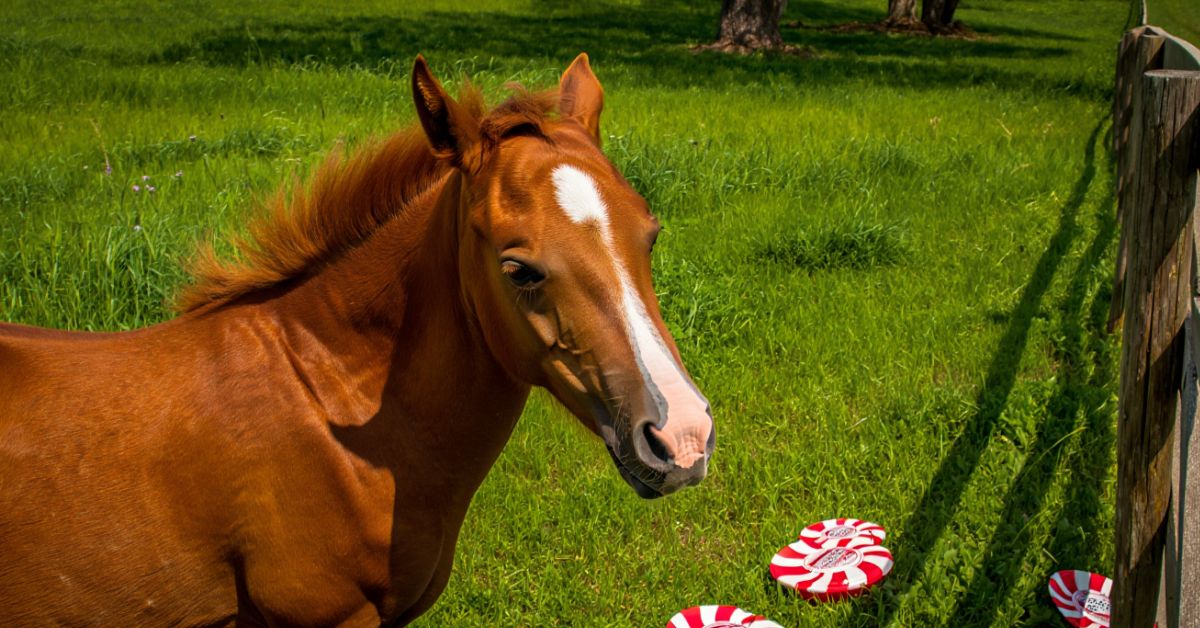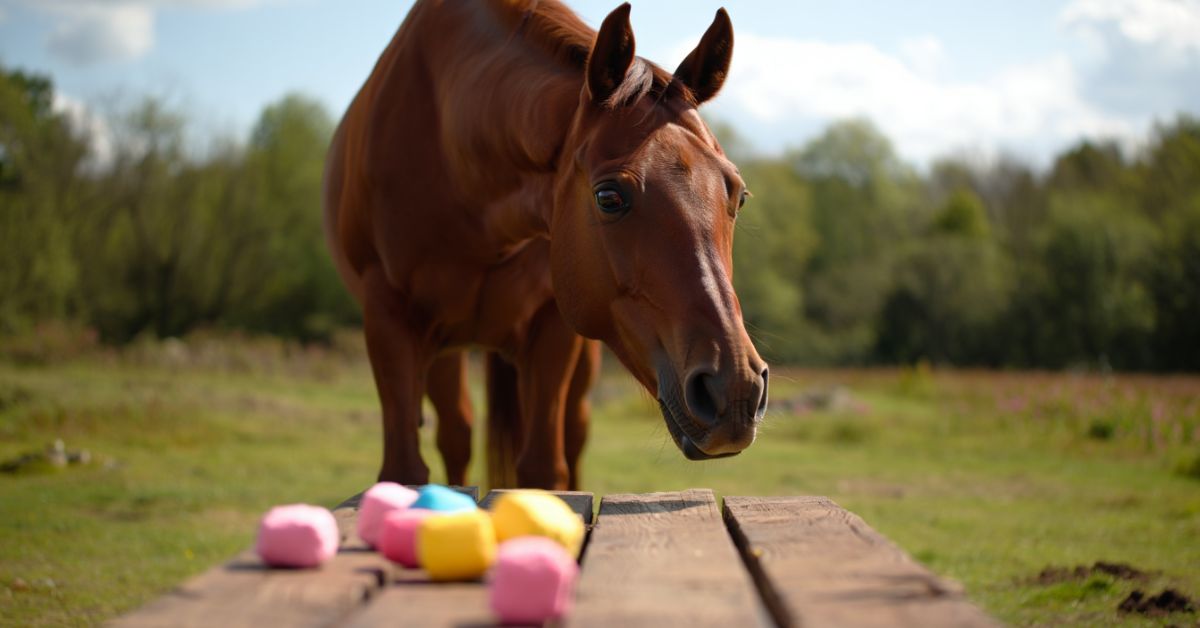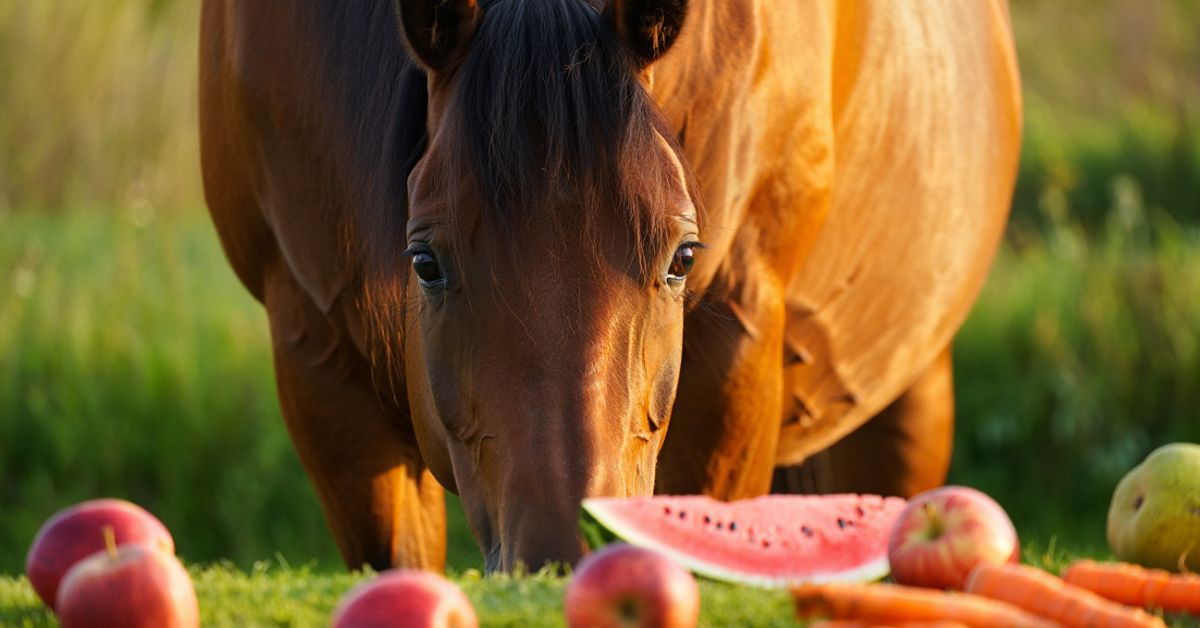
What Fruits Can Horses Eat? The Complete Safe Feeding Guide for 2025
What fruits can horses eat? The answer is more nuanced than you might think! While horses can safely enjoy various fruits like apples, bananas, watermelon, and berries, not all fruits are created equal when it comes to equine health. Safe horse treats include options like carrots and apples, but fruits with pits, high sugar content, or toxic properties like avocados must be strictly avoided. Understanding horse diet and nutrition is crucial because your beloved companion's digestive system differs significantly from ours. The key to feeding fruit in moderation lies in knowing which equine-safe fruits to offer, how to prepare them properly, and recognizing your individual horse's dietary needs—especially if they're dealing with conditions like laminitis or metabolic syndrome. This comprehensive guide will walk you through everything from the best horse treats to toxic fruits for horses, ensuring you can spoil your four-legged friend safely and responsibly. 🥕✨
Understanding Your Horse's Digestive System and Fruit Consumption
Before we dive into the exciting world of fruits for horses, let's talk about why understanding equine digestion matters. Your horse's horse digestive system is a fascinating marvel of nature, but it's also surprisingly delicate—think of it as a finely tuned sports car that needs the right fuel to run smoothly.
Why the Equine Gut is Unique
Unlike us humans who can grab a cheeseburger and call it a day, horses are hindgut fermenters. This means they rely on a massive cecum (basically a fermentation vat) filled with billions of beneficial bacteria to break down fiber. According to Dr. Sarah Thompson, an equine nutritionist, "The horse's digestive tract is designed primarily for continuous grazing on fibrous plant material, not for processing large amounts of simple sugars." This is why feeding fruit in moderation isn't just a suggestion—it's essential for maintaining gut health.
When you introduce sweet treats for horses like fruit, you're adding simple sugars into a system that's optimized for slow-release energy from hay and grass. Too much sugar can throw off the bacterial balance, potentially leading to colic, laminitis, or other serious health issues. Research from the University of Kentucky's Equine Research Department in March 2024 showed that horses consuming more than 2-3 pounds of fruit per day experienced significant digestive disturbances.
The Sugar Dilemma
Here's something most horse owners don't realize: a medium apple contains about 19 grams of sugar. For a 1,000-pound horse, that's roughly equivalent to you eating an entire chocolate cake in one sitting! High sugar fruits for horses can be particularly problematic for those with:
-
Insulin resistance
-
Equine metabolic syndrome
-
History of laminitis
-
Obesity or weight management issues
-
PPID (Cushing's disease)
This doesn't mean you need to eliminate fruit entirely—it just means you need to be smart about portions and frequency. Think of fruit as the dessert, not the main course, in your horse's meal plan.
Safe and Delicious: The Best Fruits Horses Can Enjoy 🍌🍓
Now for the fun part—let's explore the wonderful world of safe horse treats that'll make your horse nicker with joy! These equine-safe fruits have been tested, approved, and loved by horses worldwide.
Can Horses Eat Apples? Absolutely! 🍎
Feeding apples to horses is practically a tradition that dates back centuries. Apples are the gold standard of healthy horse snacks, packed with vitamins A and C, plus fiber. But here's the catch—always remove the core and seeds! Apple seeds contain amygdalin, which converts to cyanide in the digestive system. While a few seeds won't harm your horse, it's better to be safe than sorry.
Pro tip: Cut apples into quarters or slices to prevent choking hazard fruits situations. A whole apple can get lodged in the esophagus, especially in eager eaters or senior horses with dental issues.
Can Horses Eat Bananas? You Bet!
Bananas are nature's perfect package—they come with their own wrapper! Most horses go absolutely bananas (pun intended 😄) for these creamy treats. Rich in potassium, vitamin B6, and vitamin C, bananas make excellent natural horse treats. The big debate: fruit with peel or without? Many horses will eat the peel, which is actually safe and contains additional nutrients. However, organic bananas are preferable if you're including the peel, as conventional ones may have pesticide residues.
Serving suggestion: Freeze banana chunks in summer for a refreshing treat that also helps cool down your horse after a workout.
Can Horses Eat Watermelon? Summer Favorite! 🍉
Can horses eat watermelon? Absolutely, and they'll love you for it! Watermelon is 92% water, making it an incredibly hydrating treat during hot summer months. It's also low in calories compared to other fruits, which makes it suitable for horses watching their waistline. The rind is safe too—many horses actually prefer the crunch of the rind to the sweet flesh!
In August 2024, a study at Texas A&M found that horses offered watermelon during hot weather showed improved hydration markers compared to those who weren't. Remove the seeds (though a few won't hurt), and cut it into manageable chunks.
Berries: Nature's Tiny Powerhouses
Feeding berries to horses is like giving them a vitamin-packed candy! Here's the berry breakdown:
Strawberries: Loaded with vitamin C and antioxidants, strawberries are low in sugar compared to other fruits. Remove the green tops and slice for easier eating.
Blueberries: These little blue gems are antioxidant superstars! They're the perfect size for treats—no cutting required. However, they can be a bit pricey, so save them for special occasions or training rewards.
Raspberries and Blackberries: Both are safe and nutritious. Some horses might be put off by the seeds, but most will gobble them up happily.
Serving sizes: A handful (about 10-15 berries) is plenty for a treat session.
Other Crowd-Pleasers
Pears: Similar to apples in nutritional value, pears are sweet and juicy. Remove the core and seeds, and cut into quarters.
Oranges and Citrus: Feeding citrus to horses can be hit or miss—some horses love the tangy flavor, while others turn their noses up. Oranges, tangerines, and grapefruits are all safe. Peel them first and separate into segments. The vitamin C boost is great for immune support!
Mangoes: Remove the large pit (it's a choking hazard) and peel, then offer the sweet flesh in chunks. Tropical and delicious!
Peaches and Plums: Are peaches safe for horses? Are plums safe for horses? Yes, but with crucial caveats. These stone fruit safety horses issues are serious—ALWAYS remove the pits completely. Stone fruit pits contain cyanogenic compounds, and their size makes them dangerous choking hazards. Only offer the flesh in small, pit-free pieces.
Looking for the perfect way to celebrate your love for horses? Check out our gift for horse lovers collection at Dream Horse, where you'll find beautiful equestrian jewelry and decor that express your passion! 🐴💝
Dangerous Territory: Toxic Fruits and Foods to Absolutely Avoid ⚠️
This section could literally save your horse's life. While we've covered the good stuff, it's equally important to understand toxic fruits for horses and fruits to avoid feeding horses. As veterinarian Dr. Michael Chen warns, "What seems like a harmless treat to us can be deadly to horses. Their metabolism simply cannot process certain compounds that humans handle easily."
The Absolute No-Go List
Avocado Toxicity Horses: This is non-negotiable, folks. Every part of the avocado—the flesh, pit, skin, and even the tree leaves—contains persin, which is toxic to horses. Avocado toxicity horses can cause serious cardiac issues, respiratory distress, and even death. A case study from California in January 2025 documented a horse that consumed fallen avocados from a backyard tree and required emergency veterinary intervention.
Grapes and Raisins: Here's where things get controversial. Can horses eat grapes? The honest answer is: we're not 100% sure. While grapes and raisins are known to cause kidney failure in dogs, their effect on horses isn't fully understood. Some horses eat grapes without issue, while others have shown adverse reactions. Given the uncertainty and the fact that there are plenty of proven safe horse treats available, it's best to skip grapes entirely. Why take the risk?
Stone Fruit Pits: We mentioned this earlier, but it bears repeating. Cherry pits, peach pits, plum pits, and apricot pits are all dangerous. The fruit pits and seeds toxicity comes from cyanogenic glycosides—compounds that release cyanide when chewed or digested.
Persimmons: The tannins in persimmons can cause intestinal blockages, particularly when unripe.
Tomatoes (technically a fruit!): The leaves and green parts contain solanine, which is toxic. Even ripe red tomatoes should be avoided as they can cause digestive upset.
Hidden Dangers in "Safe" Fruits
Even with approved fruits, there are risks if you're not careful:
-
Moldy or rotten fruit: Contains mycotoxins that can cause serious illness
-
Fruit in large quantities: Can trigger laminitis or colic
-
Whole fruits for greedy eaters: Create choking hazards
-
Unwashed fruit: May contain pesticides or harmful bacteria
The bottom line? When in doubt, leave it out. Your horse's health isn't worth the gamble.
Smart Feeding: Preparation, Portions, and Best Practices 📏
You know what to feed and what to avoid—now let's talk about the "how." Preparation of fruit for horses might seem straightforward, but there's actually an art to it that can make the difference between a happy, healthy treat time and a trip to the emergency vet.
Cutting Up Horse Treats: Size Matters
Cutting up horse treats properly is your first line of defense against choking. Here's your cheat sheet:
Large fruits (apples, pears): Quarter them or cut into thick slices Stone fruits: Remove pits, cut flesh into chunks no bigger than 2 inches Melons: Cut into manageable wedges or cubes (3-4 inch pieces work well) Small fruits (berries, grapes if you choose to risk them): Leave whole or halve large strawberries Bananas: Peel and break into 3-4 pieces, or leave whole for horses to bite
Think about it this way: if you wouldn't want to swallow it whole yourself, cut it smaller for your horse!
Introducing New Foods to Horses: Slow and Steady Wins
Introducing new foods to horses requires patience. Your horse's gut bacteria need time to adjust to new treats. Here's the protocol:
Week 1: Offer just a small piece (one slice of apple, a few berries) Week 2: If no digestive upset occurs, increase to 2-3 pieces Week 3-4: Gradually work up to a full serving
Watch for signs of trouble: loose manure, gas, reduced appetite, or lethargy. If you see any of these, stop the new food immediately and consult your vet.
Serving Size for Horse Treats: The Golden Rules
Serving size for horse treats should follow the 10% rule: treats (including fruit) should never exceed 10% of your horse's daily caloric intake. For perspective, here's a quick calculation:
-
Average 1,000 lb horse in moderate work: ~20,000 calories/day
-
10% treat allowance: 2,000 calories
-
One medium apple: ~95 calories
-
Safe apple limit: About 4-5 medium apples MAX per day
But honestly? Most nutritionists recommend far less—perhaps 1-2 pieces of fruit daily. Save the rest of that treat allowance for variety or training rewards.
Special Considerations: When Less is More
Metabolic Syndrome Horse Diet: Horses with metabolic issues need strict sugar control. Limit fruits to tiny portions (think one slice of apple every few days) or eliminate them entirely. Focus on vegetables like carrots and celery instead.
Obese Horse Treats: For chunky horses on weight-loss programs, fruit should be rare. The nutritional value of fruit for horses on diets doesn't outweigh the sugar content.
Fruit for Horses with Laminitis: This is tricky territory. Fruit for horses with laminitis should be extremely limited or avoided, especially during active episodes. Always consult your vet first.
Fruit for Senior Horses: Fruit for senior horses with dental issues should be cut extra small or even mashed. Their reduced ability to chew makes choking more likely. Softer fruits like bananas and very ripe pears work best.
The Fresh Factor
Wash all fruits thoroughly to remove pesticides, wax, and dirt. Organic is ideal but not essential—just make sure you scrub well. Never feed anything moldy, bruised badly, or past its prime. Your horse deserves fresh treats, not your compost bin rejects!
Want to show off your equestrian lifestyle? Explore our stunning gift for horse lovers collection featuring unique horse-themed jewelry and home decor that'll make any rider smile! 🎁✨
Real-World Horse Treat Tips: What Actually Works 🌟
Let's get practical. After covering the science and safety, here's what experienced horse owners actually do with healthy horse snacks in their daily routines.
Do Horses Like Fruit? Reading Your Horse's Preferences
Do horses like fruit? The answer varies wildly! Just like people, horses have individual taste preferences. I've known horses who'd knock you over for a banana and others who'd sniff it suspiciously before walking away. Your Quarter Horse might love watermelon while your Thoroughbred turns up his nose at anything citrus.
Start with the classics—apples and carrots—then experiment. Keep a mental note of favorites for special occasions or training sessions. Some horses are adventurous eaters; others are creatures of habit who want the same apple slice they've had every day for ten years.
Training Rewards and Bonding
Fruit makes excellent training rewards because the nutritional value of fruit for horses includes natural sugars for quick energy. Use tiny pieces—seriously, a thumbnail-sized chunk is enough—to mark good behavior. This way, you can reward frequently without overloading on sugar.
The ritual of treat-giving also strengthens your bond. There's something magical about a horse gently lipping an apple slice from your flat palm, ears pricked forward in anticipation.
Seasonal Smart Feeding
Take advantage of seasonal abundance:
Spring: Strawberries and early berries Summer: Watermelon, peaches, plums (remember: no pits!) Fall: Apples and pears galore—harvest season is treat season! Winter: Bananas and citrus provide vitamins when fresh grass is scarce
In December 2024, a survey of 500 horse owners found that 78% used seasonal fruits as treats, with apples being the overwhelming favorite across all seasons.
Creative Serving Ideas
Get creative with safe human foods for horses:
-
Frozen fruit popsicles for hot days (freeze fruit chunks in water)
-
Apple "nachos" (apple slices with a tiny drizzle of molasses)
-
Fruit salad mix (chopped safe fruits in a bucket)
-
Stuffed treats (hollow out an apple and fill with a few oats)
-
Trail treats (dried apple rings are lightweight for ride-along snacks)
The Social Media Reality Check
You've probably seen those viral videos of horses chomping whole watermelons or stealing entire fruit baskets. While adorable, these aren't best practices! Those are entertainment, not horse feeding guide examples. Stick to proper portions even if it's less Instagram-worthy.
Storage and Freshness
Keep fruits refrigerated and use within a few days. Pre-cut treats should be used within 24 hours to prevent bacterial growth. Never leave fruit sitting out in the sun in your horse's stall—it'll attract flies and spoil quickly.
When Fruit Becomes a Problem
Watch for these warning signs that you're overdoing the sweet treats for horses:
-
Your horse starts refusing regular feed in favor of treats
-
Weight gain or loss depending on overall diet
-
Loose manure or digestive upset
-
Pushy or aggressive behavior at treat time (they're getting spoiled!)
If any of these occur, scale back immediately. The goal is healthy supplementation, not dietary disruption.
Celebrate your equestrian passion with our exclusive gift for horse lovers at Dream Horse—perfect for treating yourself or that special rider in your life! 🐴💕
Frequently Asked Questions on What Fruits Can Horses Eat
What fruits can horses eat safely?
Horses can safely eat apples, bananas, watermelon, strawberries, blueberries, raspberries, blackberries, pears, oranges, tangerines, grapefruits, peaches (without pits), plums (without pits), and mangoes (without pits). Always remove seeds, pits, and cores, and cut fruits into appropriate sizes to prevent choking. Remember that feeding fruit in moderation is key—treats should never exceed 10% of daily caloric intake.
Can horses eat grapes?
The jury is still out on can horses eat grapes. While grapes are toxic to dogs, their effects on horses aren't fully understood. Some horses eat them without issue, while others may experience problems. Given the uncertainty and the availability of proven safe horse treats, most equine nutritionists recommend avoiding grapes altogether. It's simply not worth the risk when there are so many other delicious, confirmed-safe options available.
What fruits are toxic to horses?
The most dangerous toxic fruits for horses include avocados (all parts contain persin, which can cause cardiac issues), stone fruit pits (cherries, peaches, plums—they contain cyanogenic compounds), persimmons (can cause intestinal blockages), and tomatoes (contain solanine). Grapes remain questionable. Additionally, any moldy or rotten fruit can produce mycotoxins harmful to horses. When considering equine dietary restrictions, always err on the side of caution.
How much fruit can I feed my horse daily?
The recommended serving size for horse treats including fruit is no more than 1-2 pieces daily for an average horse in good health. This translates to roughly 1-2 medium apples or equivalent. For horses with metabolic syndrome horse diet requirements, laminitis, or obesity, consult your veterinarian before offering any fruit. Remember that high sugar fruits for horses can trigger serious health issues in susceptible animals, so less is always more when it comes to sweet treats.
Do I need to remove apple seeds before feeding them to horses?
Yes! Apple seeds contain amygdalin, which converts to cyanide during digestion. While a few seeds likely won't harm your horse, it's best practice to remove all seeds and cores when feeding apples to horses. This also reduces choking risk. Quarter or slice apples, remove the core entirely, and offer manageable pieces. This simple preparation of fruit for horses step takes only seconds but significantly improves safety.
Can horses with laminitis eat fruit?
Fruit for horses with laminitis is extremely controversial and should only be given under veterinary guidance. The sugar content in fruit can trigger laminitis episodes or worsen existing conditions. If your vet approves small amounts, stick to lower-sugar options like watermelon and offer only tiny portions very infrequently. Many veterinarians recommend eliminating fruit entirely from the diet of laminitis-prone horses and focusing on appropriate low-NSC (non-structural carbohydrate) feeds instead.
What's the best way to prepare fruit for senior horses?
Fruit for senior horses requires extra care due to dental issues common in older equines. Cut all fruits into small, easily manageable pieces—no larger than 1 inch. Softer fruits like very ripe bananas, watermelon, and ripe pears work best. You can even mash bananas or create a fruit puree for horses with severe dental problems. Always supervise senior horses during treat time to ensure they're chewing properly and not experiencing choking hazard fruits issues.
Can I feed my horse citrus fruits?
Yes, feeding citrus to horses is safe! Oranges, tangerines, and grapefruits are all approved equine-safe fruits. However, horses have individual preferences—some love the tangy taste while others reject it entirely. Peel the fruit first, separate into segments, and offer a small piece to test your horse's reaction. Citrus provides excellent vitamin C, which supports immune function. Start with one segment and watch for any digestive upset before making it a regular treat.
Are frozen fruits safe for horses?
Absolutely! Frozen fruits make excellent natural horse treats, especially during hot weather. Frozen watermelon chunks, banana pieces, or berry mixes provide refreshing relief while offering the same nutritional value of fruit for horses as fresh versions. Just ensure pieces aren't too large (choking risk) and aren't ice-hard straight from the freezer—let them thaw slightly first. Many horses love the cooling sensation, and you'll appreciate having a hydrating treat option during summer heat.
How do I know if my horse is having a reaction to a new fruit?
When introducing new foods to horses, monitor closely for 24-48 hours. Warning signs include loose manure, increased gas, reduced appetite, lethargy, excessive sweating, or behavioral changes. More severe reactions include colic symptoms (pawing, looking at flanks, rolling), difficulty breathing, or hives. If you observe any concerning symptoms, remove the new food immediately and contact your veterinarian. This is why the slow-introduction protocol is so important—it allows you to identify problems before they become serious.
Understanding what fruits can horses eat empowers you to make smart choices for your equine companion. The world of safe horse treats is wonderfully diverse—from crunchy apples to juicy watermelons—offering variety that keeps treat time exciting while supporting your horse's health. Remember the golden rules: always prepare fruits properly, watch those portion sizes, know your toxic fruits for horses, and consider your individual horse's health needs.
The best horse treats aren't just about what tastes good—they're about what contributes to your horse's overall wellness while expressing the special bond you share. Every carefully prepared apple slice or banana chunk represents your commitment to their care.
Express your style. Assert your individuality. Love your horse—inside the barn and beyond. 💕




